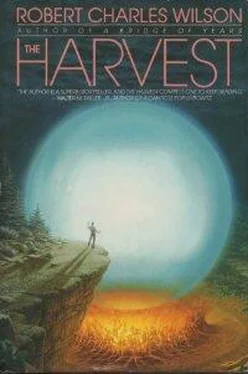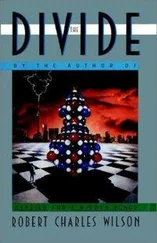He felt her relief.
William stood away as Rosa began to unfold.
* * *
The sun was well above the horizon when she stood at last beside the bed, her enormous wings trembling in the cool air from the window.
Rosa Perry Connor, in her present incarnation, weighed less than fifteen pounds. Her new body was a hollow shell of what had once been human bone and tissue, transformed by the action of the neocytes into something more brittle and much less dense. Her features were diminished and compressed but still recognizable. She had an attractive face, William thought. Her eyes were large and bright.
She blinked at him, still mute. Her lungs were a fragile bellows, her vocal cords a memory. Her pupils, unaccustomed to the light, were black pinpoints. Her wings were a double ellipse around the axis of her body, and sunlight through the moist tissue made bright moires of blue and purple.
William felt her exhilaration. Curious, he thought, the way some of us manufactured these destinies for ourselves—these last, brief incarnations on the surface of the Earth. She didn’t seem strange at all. Only a stubborn dream given fleeting substance.
The membranes of the wings needed to dry before Rosa could use them. William didn’t hurry her—there was nothing she could do to speed the process.
He tore the drapes away from the window, the only practical exit. It was an old-fashioned window, one fixed pane and one counterweighted pane to slide up in front of it. Rosa’s body was tiny now and her wings were flexible, but she would need more space than this.
He shattered both panes and carefully, meticulously, plucked away the splinters of glass and tossed them to the dry earth below. Then, with surprising strength for a boy of his size, he grasped the obstructing arm of the wooden frame and pulled until it cracked and came away.
Some splinters remained in the wood despite his effort. The palm of his right hand was scratched; the blood that oozed out was dark and viscous, almost black.
* * *
Tyler looked up as he crossed the truckstop parking lot with Joey Commoner beside him. “Joseph? Did you hear that?”
“Sir? Uh—no.”
“A sound like breaking glass?”
“No, sir.”
Sound carries a distance in this still air, Tyler thought, across this dry prairie. He took a shallow breath, listening, but there was only silence.
“Hurry everybody along,” he said. “Breakfast is over. We have business to attend to.”
“Sir,” Joey said.
* * *
William heard the engines come to life one by one, though he couldn’t see the truckstop from this window.
I know, Rosa assured him. Soon now.
There was not much margin, the boy thought, on this brink of time.
* * *
The caravan of RVs made its way up the private road and parked in a ponderous line outside the Connor farmhouse.
Abby Cushman liked the look of the house. It was a fancy two-story frame house, a comforting contrast to the range land all around it. It occupied its space with a doughty colonial dignity.
The front door was unlocked. Abby filed in behind Colonel Tyler and his lieutenants. The inside of the house was nice, too, she thought—though a broken window in the living room had let in the wind and tumbled some of the contents.
This big, central room was decorated in a southwest/Hopi style that had been fashionable some years ago and seemed curiously misplaced on a northern prairie. Pattern rugs, beige walls, a long sand-colored sofa, and Kachina dolls on a sideboard; squat porcelain lamps. She wondered who had lived here. Someone dislocated, Abby thought. Someone out of place.
Colonel Tyler had gone off to investigate the kitchen and the cellar for supplies. Abby said, “I’ll check upstairs,” to Matt Wheeler, who was helping a breathless Miriam Flett into a chair.
It was odd that William wasn’t with her. The old woman and the boy were almost inseparable these days. Come to think of it, Miriam had been acting strangely for days.
She thought of asking, thought better of it. Mind your own business, Abby. There had been much discontent in camp lately, and none of it was mysterious. This journey had demonstrated all too graphically the emptiness of the world and the inadequacy of the human temperament. America is as empty as an old cup, Abby thought, and the best we can do by way of survivors is a cowardly old man like Tom Kindle.
Unpleasant thought.
She hurried upstairs to a carpeted hallway, cool and dim, and three closed doors—the bedrooms, Abby supposed.
* * *
William heard the rattle of the doorknob behind him. Rosa—
I know, she said. She took a step—a delicately balanced pirouette—toward the window. He felt her unsteadiness. Thank you, she said. Whatever happens.
So accustomed had Abby grown to the vacancy of the world that she was astonished, above all else, to find the second bedroom occupied. “William!” she said.
Then she looked at the window… at the thing in front of the window.
It was a delicate silhouette in the morning light. She thought at first it must be a kind of decoration—some eccentric assemblage of cellophane panels meant to break the morning light into these fractions of purple and blue. But then it moved. It was alive, somehow organic… she discovered eyes, a sort of face.
William raised his fingers to his lips, a child’s Be quiet! And Abby stifled an urge to cry out.
“Don’t be afraid,” the boy whispered.
But of course she was afraid. She saw the broken cocoon on the faded bedspread. It was an insect thing. Abby had never liked insects. Her older brothers used to torment her with caterpillars. The cocoon on the bed implied that this creature was a kind of human bug, and the idea was so distasteful that Abby wanted to flee the room or call out for help.
William appeared to sense her distress. “Abby,” he said—it was the first time William had called her by her given name, as if he were an adult—“this is Rosa Connor. She can’t speak. But she won’t hurt you. All she wants to do is leave. She’s fragile, and I’m afraid she’ll get hurt if the others find her here. Abby, do you understand?”
Of course she did not. How could one understand such things?
But she recognized the sincerity in William’s voice. He was an odd child, Abby thought dizzily. Abby knew children. She had raised a daughter of her own and had been raising her daughter’s two boys when Contact took them away. William looked a little like Cory, her oldest grandson. Cory had always been bringing things home. Stones, bottletops—cocoons. She had tried to share his interest, at least from a distance; had tried to enter that child’s world where everything was a mystery and a fascination. Perhaps William was fascinated with this—creature.
Abby’s heart was pounding desperately against her ribs. But she thought of Paul Jacopetti in the basement of the Buchanan hospital, and she resolved to quell her panic this time, not make the same mistake.
She closed her eyes and swallowed hard. “If it wants to leave,” she said, “why doesn’t it?”
“Abby, did you ever see a butterfly when it’s new? The wings are wet. They have to dry. Otherwise it would just fall.”
“I see. How much longer?”
“Minutes.”
“William—I can’t stop anyone from coming upstairs.”
“But if you don’t call out—”
“I won’t.” She was steadily calmer. “But Colonel Tyler is searching the house.”
“We only need a short time, Abby.”
“A short time is all you may have.”
Читать дальше












